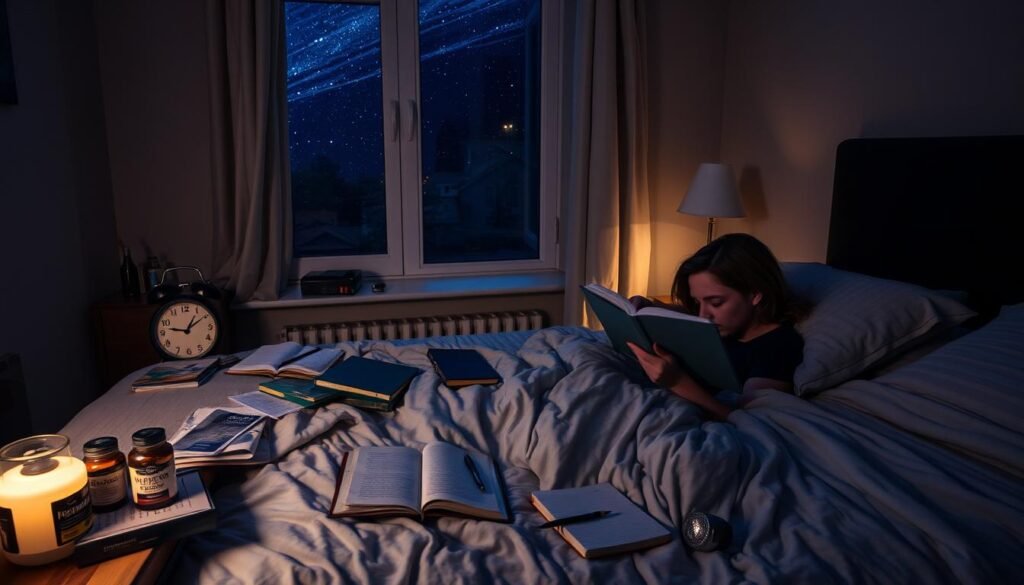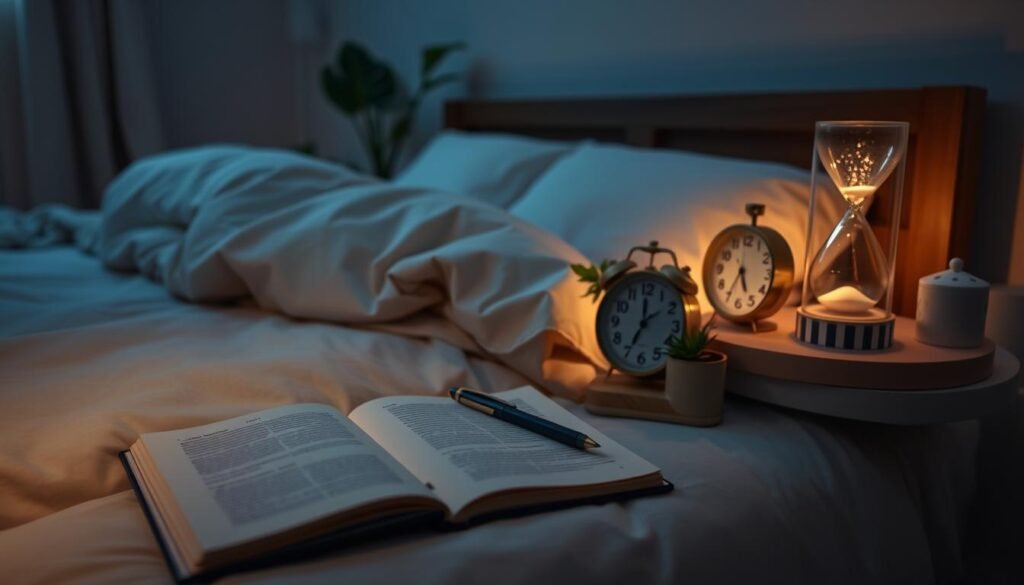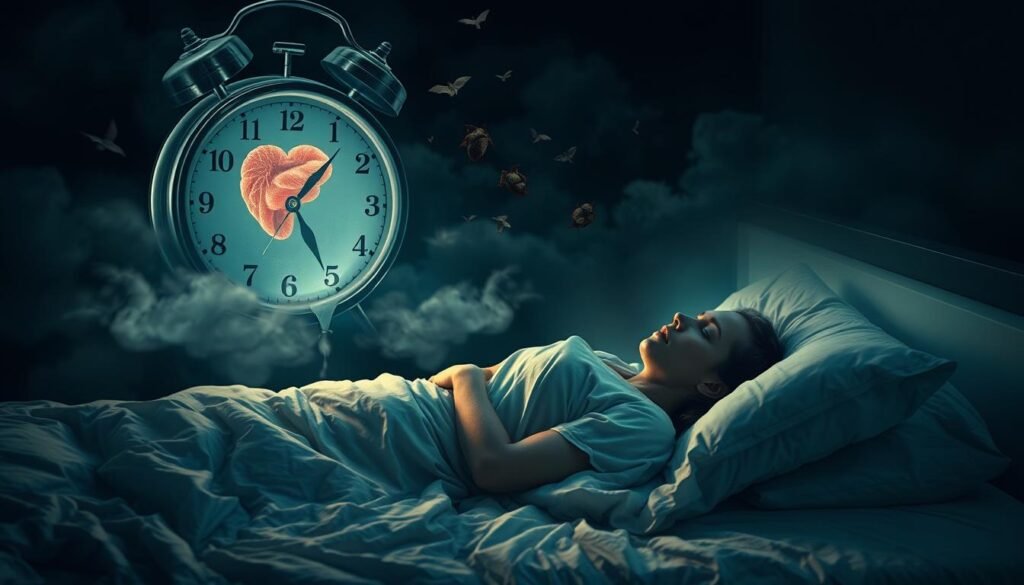Did you know that around 70% of people with PTSD also have trouble sleeping? For veterans, these sleep problems can really affect their life and everyday tasks. It’s vital to understand the link between VA insomnia secondary to PTSD for those seeking disability support from Veterans Affairs.
Many veterans face ongoing issues from past traumas, making it important to deal with sleep problems linked to PTSD as part of their healing. This article will help illuminate symptoms, impacts, and how to go about making a claim. It aims to help veterans find their way through these challenges with greater ease. To learn more about the connection between these conditions, click here.
Key Takeaways
- 70% of those with PTSD report insomnia or sleep disturbances.
- Veterans may qualify for a disability rating of 30% for chronic sleep impairment.
- Severe insomnia disrupting daily functioning can support a 50% rating.
- Claims for insomnia linked to PTSD require thorough documentation.
- Cognitive Behavioral Therapy is an effective treatment for insomnia.
- Understanding VA claims processes is crucial for veterans with sleep issues.
The Link Between PTSD and Insomnia
Understanding the link between PTSD and insomnia shows how deeply these issues affect veterans. PTSD symptoms like anxiety, nightmares, and hyperarousal lead to sleep problems. Almost all individuals with PTSD struggle to sleep well. Insomnia is especially common in veterans.
Understanding PTSD and Its Symptoms
PTSD includes symptoms such as intrusive memories, intense emotional responses, and sleep issues like insomnia. Veterans with PTSD often can’t fall asleep or stay asleep. Over 80% of veterans getting treatment report sleep disturbances. This shows the deep link between PTSD and sleep issues.
How Insomnia is Manifested in Veterans
For veterans, insomnia might mean trouble falling asleep, staying asleep, or waking up too early. These sleep problems can make PTSD symptoms worse. However, treatments like Cognitive Behavioral Therapy for Insomnia (CBT-I) help about 70% of those who try it. Dealing with these sleep issues is key to improving life for veterans with PTSD.
VA Insomnia Secondary to PTSD: An Overview
The link between sleep problems and PTSD is deep. For many veterans, bad sleep messes with their whole life. It changes how they feel mentally and physically every day.
Knowing what sleep issues mean for PTSD shows how big an effect it has on veterans’ lives.
Definition of Sleep Disturbances Within PTSD
Sleep problems can vary a lot. They include trouble getting to sleep, staying asleep, or feeling rested. Many veterans with PTSD often feel they can’t sleep well. This problem happens at least three nights a week for months.
Stress, medication, or past traumas can make it worse. If it happens three times a week for over a month, it’s called chronic insomnia.
Impact on Veterans’ Daily Lives
Sleep issues cause big problems for veterans. Insomnia makes it hard to stay sharp, think clearly, or be happy. It might be hard for them to work well, make friends, or keep close relationships.
Not sleeping enough can make anxiety and PTSD symptoms worse. This creates a tough cycle to break.
It’s vital for veterans to get help for sleep problems to better their lives. The Veterans Affairs system offers help and treatments specifically for these sleep issues. Getting to know these resources is a key step in recovery.
Insomnia Diagnosis Criteria
For veterans, especially those struggling with PTSD, knowing the criteria for an insomnia diagnosis is key. Insomnia means you have trouble starting or staying asleep, or you don’t feel refreshed after sleep. The National Institute of Health says this must happen for at least three nights a week and last for three months to be diagnosed.
Symptoms of Insomnia Related to PTSD
Insomnia can show differently in those with PTSD. You might find it hard to fall asleep or keep waking up. You may also feel really tired during the day, get easily upset, or have trouble focusing.
- Trouble falling asleep
- Frequent awakenings during the night
- Waking up too early
- Daytime fatigue
- Irritability and mood swings
- Concentration difficulties
A lot of veterans with PTSD feel more anxious about sleep. A very high number of Vietnam-era veterans with PTSD, between 90-100%, suffer from insomnia. This shows why it’s so crucial to get diagnosed and treated correctly.
Chronic vs. Acute Insomnia in Veterans
Insomnia falls into two categories: acute and chronic. Acute insomnia is short, only lasting a few days to weeks. On the other hand, chronic insomnia hangs around longer. It happens at least three nights a week for more than three months and can really impact someone’s life.
Chronic insomnia also links to serious health issues like heart disease, diabetes, and high blood pressure. It’s very important for veterans to get the right diagnosis for insomnia. Knowing the difference helps find the best treatment, which can lead to feeling better overall.
The Importance of Documenting Sleep Issues
Veterans dealing with insomnia face many hurdles in VA claims. It’s crucial they document sleep issues well. This helps them get the benefits they’ve earned. Showing clear proof of insomnia and its link to PTSD can make their claim stronger.
Required Evidence for VA Claims
Veterans need a lot of VA claims evidence to support their case. This includes:
- Service treatment records detailing sleep problems.
- Medical opinions that connect PTSD to insomnia.
- Records of ongoing treatments or interventions.
This documentation tells the story of how insomnia impacts their life. It shows why they need benefits.
Medical Documentation and Lay Statements
Official medical records and lay statements from those close to the veteran are key. Statements from family, friends, or coworkers highlight how sleep problems affect their life. This extra information makes the veteran’s case stronger to the VA.
To sum up, good documentation and lay statements help veterans in the VA claims process. They increase chances to get the benefits they deserve. For more on effective sleep treatments for veterans, check out this resource.

| Documentation Type | Description |
|---|---|
| Service Treatment Records | Official records detailing the veteran’s sleep disorders during service. |
| Medical Nexus Opinions | Expert opinions linking insomnia to PTSD or other service-related conditions. |
| Lay Statements | Personal accounts from family and friends regarding the veteran’s sleep issues. |
Applying for VA Disability Benefits for Insomnia
Veterans with insomnia linked to PTSD often find the VA claims process crucial. Knowing the steps can improve the chances of their claim being approved. It starts with getting a diagnosis from a VA doctor. This proves the connection between insomnia and the PTSD they got while serving.
Steps to File a Claim for Insomnia as a Secondary Condition
To file for VA disability benefits for insomnia, you need to follow these steps:
- Obtain a formal diagnosis: See a VA healthcare provider to get the insomnia diagnosis. Make sure it clearly ties back to PTSD.
- Gather necessary documentation: Put together medical records, treatment history, and any documents that support the insomnia claim.
- File the claim: Submit it online or by mail, attaching all paperwork. This proves insomnia as a secondary condition to PTSD.
- Keep records of all communications: Write down talks with VA reps and keep copies of documents for later.
Understanding Your Rights and Benefits
Veterans have many rights in applying for VA disability benefits. This includes appealing if their insomnia claim is denied. The VA gives disability ratings for insomnia from 0% to 100%. The ratings are based on how bad the symptoms are and their effect on daily life. A 0% rating means the effects are mild. A 100% rating shows complete inability to function in social and work situations.
If veterans get a 60% rating or above, they might get Total Disability Individual Unemployability (TDIU) benefits. This can help a lot in their recovery. Knowing these rights and benefits can empower veterans in the claims process. Paying attention to how symptoms affect daily life can show the need for support.
The Role of Cognitive Behavioral Therapy (CBT)
Cognitive Behavioral Therapy (CBT) is key in treating insomnia caused by PTSD. It aims to change the negative thoughts and actions that affect sleep. Using CBT for insomnia shows great improvements, helping veterans with sleep issues and PTSD.
Effective CBT Techniques for Managing Insomnia
Cognitive behavioral therapy for insomnia (CBT-I) offers methods to make sleep better. These strategies involve:
- Sleep Restriction Therapy: It cuts down time being awake in bed. This makes the bed more linked to sleep.
- Cognitive Restructuring: It tackles the thoughts and worries that stop sleep.
- Stimulus Control: It helps make associations that aid in sleeping. Actions like using the bed just for sleep and intimacy are promoted.
- Relaxation Techniques: This includes deep breathing and muscle relaxation to relax the mind.
Studies on CBT-I show a big drop in insomnia and bad sleep patterns. In one study with 45 adults, 41% fully got over their sleep issues with CBT-I. Getting better sleep also helps improve how people function every day and their social lives.
Medications for Insomnia and PTSD
Along with CBT, medicines also matter in treating insomnia and PTSD. Drugs like SSRIs and venlafaxine are common for PTSD. Using them with CBT gives the best results by tackling both mind and body issues related to insomnia.
Veterans often feel better in both sleep and mental health when using these methods together. The combo of CBT and medication can also reduce wider mental health problems veterans deal with.

| Treatment Type | Effectiveness | Notes |
|---|---|---|
| Cognitive Behavioral Therapy (CBT) | High (Effect Size: 1.28) | Proven long-term improvements in sleep and PTSD symptoms. |
| Antidepressants | Moderate (Effect Size: 0.43) | May be beneficial but generally less effective than CBT. |
| Combination of CBT and Medication | Very High | Enhances overall effectiveness in managing insomnia and PTSD. |
Veterans with PTSD-related insomnia should work with healthcare providers. They can get personal treatment plans with CBT and the right meds. This combined treatment leads to better sleep and overall health.
Common Challenges in VA Claims for Insomnia
Veterans often struggle to get disability benefits for insomnia. These struggles come from how hard it is to document their condition. It’s vital to know these obstacles and how to work through them. This knowledge ensures they get the support they need.
Overcoming Initial Denials and Appeals
Many veterans face initial denials of their VA claims for insomnia due to lacking evidence. This is tough, especially if their insomnia is due to PTSD. To fight a denial, veterans need detailed medical records, sleep study results, and a VA Nexus letter. This letter should connect their insomnia to their service. Adding personal statements can also help by showing how insomnia affects their lives.
Utilizing Legal Representation for Your Claim
Getting a lawyer can greatly increase a veteran’s chance to win an appeal. Specialized lawyers can handle the complex appeal process. They ensure documents are filled out right and sent off on time. A good lawyer simplifies legal language, making it easier to argue the case with the VA.
Veterans who seek legal help get expert guidance. They gain a strong ally in their quest for benefits. Visiting sites like VA disability benefits for insomnia provides useful tips. It can lead to better chances at getting disability benefits.
| VA Claim Challenges | Possible Solutions |
|---|---|
| Initial denial due to lack of evidence | Gather additional medical documents, including sleep studies. |
| Difficulty proving service connection | Submit lay evidence and obtain a medical opinion linking insomnia to service. |
| Complex appeals process | Consider legal representation for guidance and support. |
| Insufficient knowledge of VA procedures | Research VA regulations or consult with a legal expert. |
By facing these challenges with the right strategies, veterans can beat initial denials. They can win their benefits for insomnia. Legal support offers not just a voice in their corner. It also gives them strength throughout the VA’s demanding process.
Connection Between Insomnia and Overall Health Risks
Chronic insomnia greatly affects both the body and mind. This is especially true for veterans with PTSD. The sleep issue isn’t isolated. It leads to other health risks, making existing problems worse and lowering life quality.
Physical Health Conditions Linked to Chronic Insomnia
Chronic insomnia puts veterans at risk for many health issues. These include heart disease, diabetes, high blood pressure, obesity, and autoimmune disorders. The lack of sleep is often due to stress and changes in lifestyle. This adds to the health risks.
About 93% of veterans with PTSD struggle with insomnia. This shows how crucial it is to manage both conditions. Knowing how sleep problems and physical health are linked helps in treating them together.
Emotional and Behavioral Implications
The effects of chronic insomnia aren’t just about being tired. Veterans might feel more anxious, face a higher risk of depression, withdraw socially, and get irritable. These issues can ruin sleep further and hurt daily life and relationships.
It’s vital for veterans to get treatment that looks at both insomnia and PTSD. For more on treating these conditions together, see this article.

Veterans Affairs Resources and Support
For veterans facing insomnia due to PTSD, finding the right help is key. Veterans Affairs offers many resources tailored to boost mental health. These include treatments and community support to help you sleep better.
Accessing Mental Health Services
Many options are available for veterans seeking mental health support within the VA system, such as:
- Cognitive Behavioral Therapy for Insomnia (CBT-I): This usually includes around six sessions. It targets the thoughts and activities that affect your sleep.
- Brief Behavioral Treatment for Insomnia (BBTI): A quicker option, it involves one to four meetings with a clinician.
- SleepEZ: A free, self-guided online course, SleepEZ doesn’t require signing up. It lets veterans learn at their own pace.
- Insomnia Coach: A mobile app for Android and iOS designed to better your sleep. It’s recommended to talk to a healthcare provider before starting.
Community Programs for Veterans with PTSD and Insomnia
Community programs are a crucial part of the support network for veterans with PTSD and trouble sleeping. These include:
- Peer Support Groups: They help veterans connect, share their stories, and exchange coping strategies.
- Educational Workshops: Workshops offer important info about mental health, sleeping well, and treatment choices.
- Research Initiatives: Studies are underway to find which medications work best for sleep problems linked to PTSD. The goal is to better treatment methods and results.
Using these resources, support services, and community programs is vital. They provide a strong base for veterans working towards better sleep and mental health. Getting involved in these programs shows veterans they are not alone on their path to recovery.
Conclusion
Many veterans face a big challenge with insomnia and PTSD. Studies show 70-91% of people with PTSD struggle with sleep. This makes it key to see how these issues are linked. When veterans face both problems, their recovery gets even tougher. Insomnia can worsen treatment results and increase daily struggles, making their healing journey harder.
Knowing about VA support can really help veterans. They can get the help they need by understanding their rights. It’s crucial to know how to apply for VA benefits for insomnia linked to PTSD. Gathering medical records and personal statements is a big step. It helps show the need for help, opening doors to important resources for better health.
Veterans should always feel they can ask for help. There is support out there that can improve their lives. With the right help, dealing with PTSD and insomnia becomes easier. This support can build strength to overcome these obstacles. Getting proactive is the first step towards a restful sleep and a hopeful future.